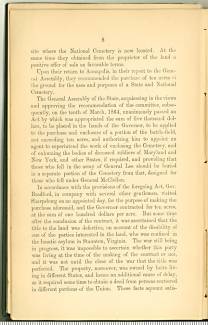Collection Name
About
site where the National Cemetery is now located. At the same time they obtained from the proprietor of the land a positive offer of sale on favorable terms.
Upon their return to Annapolis, in their report to the General Assembly, they recommended the purchase of ten acres of the ground for the uses and purposes of a State and National Cemetery.
The General Assembly of the State, acquiescing in the views and approving the recommendation of the committee, subsequently, on the tenth of March, 1864, unanimously passed an Act by which was appropriated the sum of five thousand dollars, to be placed in the hands of the Governor, to be applied to the purchase and enclosure of a portion of the battle-field, not exceeding ten acres, and authorizing him to appoint an agent to superintend the work of enclosing the Cemetery, and of exhuming the bodies of deceased soldiers of Maryland and New York, and other States, if required, and providing that those who fell in the army of General Lee should be buried in a separate portion of the Cemetery from that designed for those who fell under General McClellan.
In accordance with the provisions of the foregoing Act, Gov. Bradford, in company with several other gentlemen, visited Sharpsburg on an appointed day, for the purpose of making the purchase aforesaid, and the Governor contracted for ten acres, at the sum of one hundred dollars per acre. But some time after the conclusion of the contract, it was ascertained that the title to the land was defective, on account of the disability of one of the parties interested in the land, who was confined in the lunatic asylum in Staunton, Virginia. The war still being in progress, it was impossible to ascertain whether this party was living at the time of the making of the contract or not, and it was not until the close of the war that the title was perfected. The property, moreover, was owned by heirs living in different States, and hence an additional cause of delay, as it required some time to obtain a deed from persons scattered in different portions of the Union. These facts account satis-
